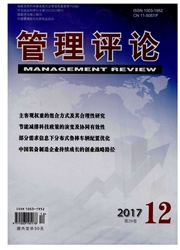

 中文摘要:
中文摘要:
作为常用的综合性价值评价工具,杜邦分析通过将资产收益分解为利润率、资产周转率和权益乘数,以期更好地判断公司的价值及其变化。本文以A股上市公司为研究对象,探讨杜邦分析的核心指标和成分指标的信息含量,并对比分析传统与改进的杜邦分析方法在我国证券市场中的适用性。结果发现:在预测公司未来的盈利能力时,净资产收益率较经营净资产收益率有效;在拟合个股当期和预测未来的收益时,结果却相反;但无论是传统的、还是改进的杜邦财务成分指标,均不具有显著的增量信息提供能力。这表明在中国证券市场上,投资者在评价公司的价值时,应更多地关注杜邦分析的核心指标而不是其成分指标。
 英文摘要:
英文摘要:
DuPont analysis is a common form of financial statement analysis and comprehensive value evaluation tool,which decomposes asset return into three components:profit margin,asset turnover and equity multiplier to better judge the value of the company and its changes.This paper explores the information content of core indexes and its component indexes of DuPont analysis,and compares the applicability of traditional and improved DuPont analysis in China' A-share markets.Our empirical results conclude that net assets return is much more informative than net operating assets return in forecasting company's future profitability,but vice versa while fitting stock's current returns and forecasting stock's future returns.For the component indexes of traditional and improved DuPont analysis,however,they do not have significant incremental information beyond the core indexes.This shows that,in China's stock markets,investors should pay more attention to the core indexes instead of the component indexes of DuPont analysis when evaluating companies.
 同期刊论文项目
同期刊论文项目
 同项目期刊论文
同项目期刊论文
 期刊信息
期刊信息
